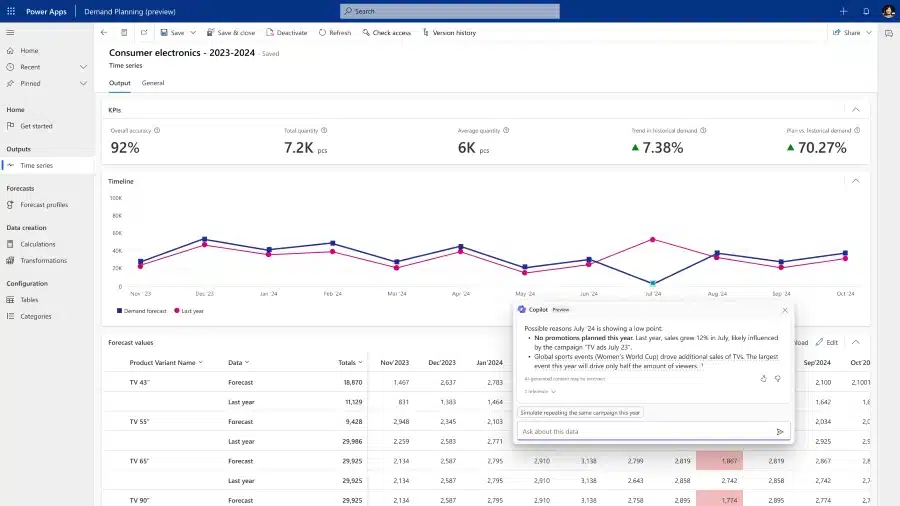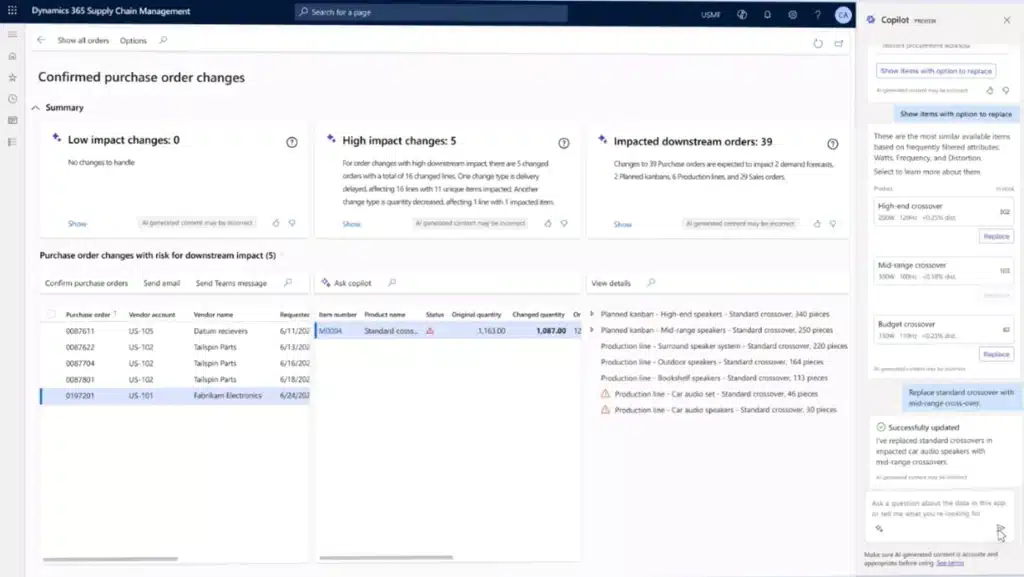
Global Content Lead - Tech & Consulting
Subscribe to the newsletter
In the present retail landscape, AI is no longer limited to sending email promotions or displaying online ads. Retailers are harnessing AI to track customer behavior both online and in-store, enabling smarter decisions in pricing, merchandising, inventory management, store layouts, and beyond.
According to McKinsey, companies leveraging AI-driven data analytics are experiencing significant benefits, with a reported 115% higher ROI and 93% higher profits. By leveraging insights into customer purchasing habits, interests, and behaviors, retailers are successfully creating personalized experiences that drive success.
From shifts in consumer purchasing habits to inventory management and supply chain complexities, with the increasing use of AI in retail industry, businesses can navigate the challenges better. Microsoft is at the forefront of this evolution, empowering Dynamics 365 with AI. This enables retailers to enhance agility, optimize operations, and drive innovation throughout the supply chain, while also transforming customer engagement.
Through this blog, let’s explore how Dynamics 365 is transforming the future of retail, particularly through AI integration within ERP and CRM operations.
Personalized customer engagement
Retailers frequently express the challenge of meeting tighter deadlines for marketing and customer experience initiatives while dealing with resource constraints. In addition, their existing processes and tools aren’t always sufficient to meet these demands.
Let’s consider an example. Launching a project involves coordinating with various stakeholders, engaging expensive third-party agencies, and using separate applications to analyze data and create content. The task of monitoring results for optimization is also time-consuming, requiring coordination across different teams and applications. These challenges not only delay campaign launches and reduce employee productivity but also lead to a disjointed customer experience.
These challenges are not unique to specific stakeholders within retail; the broader market is also feeling the strain. A recent survey found that 63% of retailers aim to enhance their marketing efforts with AI within the next 18 to 24 months. In an era dominated by AI, shouldn’t streamlining campaign launches be more straightforward?
To address this, Microsoft has introduced Copilot features in Dynamics 365 Customer Insights, designed to revolutionize how marketers oversee and execute projects and campaigns. These enhancements will boost productivity, efficiency, and speed to market. Building upon previous Copilot functionalities, such as content idea generation, natural language data querying, and AI-driven customer segmentation and journey creation, these new features offer even greater capabilities.
Marketers can now initiate their projects by outlining campaign objectives in natural language or uploading existing creative briefs. The system then generates a project board based on the input, incorporating relevant organizational data and insights from previous campaigns stored in Customer Insights. This centralized project board streamlines workflows, bringing together all aspects of marketing asset creation and management into a single, cohesive platform.
Marketers can access insights regarding the campaign’s target audience and segments within the project board. Moreover, they can receive recommendations from Copilot for additional segments that may not have been previously considered. Marketers can automatically generate a complementary customer journey by selecting a suggested audience segment. This feature not only saves time but also facilitates the delivery of personalized customer experiences.
Copilot facilitates the creation of end-to-end customer journeys, complete with personalized touchpoints like promotional emails or event invitations. Leveraging our partnership with Typeface and its enterprise-grade generative AI capabilities, marketers can generate brand-authentic images across assets, enhancing the impact of personalized content. All of this can be achieved directly within Dynamics 365 Customer Insights. Typeface further aids in aligning content with the organization’s brand guidelines, encompassing themes, fonts, and product images sourced from a central asset library.
Building real-time supply chains
From labor shortages, rising costs, and the growing need to create omnichannel retail experiences, supply chain challenges have expanded. Fortunately, enterprise AI solutions are now available to retailers, offering the potential to enhance efficiency, productivity, and innovation throughout the supply chain.
Through AI in supply chain management, enterprises can tailor their supply chains to meet diverse customer demands in real time. AI applications span demand planning, purchasing, forecasting, and inventory management, driving operational efficiency, error reduction, and inventory optimization. Microsoft, via Copilot, empowers its clients to revolutionize their supply chains. These innovations aid organizations in risk mitigation, inventory optimization, agile planning, and prompt decision-making throughout the supply chain. Let’s explore the benefits of using AI in supply chain:
Improved demand planning with Copilot capabilities
A retailer’s success depends on precise inventory management, ensuring the right products are available at the right locations and times. This begins with effective demand planning. In November 2023, Microsoft introduced advanced demand planning features in Dynamics 365, leveraging AI, machine learning, and external data signals to enhance demand planning and forecasting accuracy. Now, with the integration of Copilot, these capabilities are further enriched.

Copilot augments demand planners’ understanding of forecast generation processes, enabling them to discern patterns and anomalies efficiently. Additionally, it facilitates natural language interactions to unravel intricate data relationships and automates routine demand review report creation, freeing up planners’ time for strategic endeavors. The revamped demand planning functionalities deliver a more user-friendly experience, fostering increased trust among planners in the accuracy of forecasts.
As a result, retailers can minimize excess inventory and optimize working capital, driving operational efficiency and financial performance.
Improved productivity and less disruptions
The new Copilot features in Dynamics 365 allow supply chain teams to act on insights seamlessly within their workflow. This fosters enhanced productivity and collaboration among team members across the supply chain and other departments, facilitating proactive disruption management and workflow automation. Furthermore, the introduction of additional Copilot functionalities can enhance inventory visibility, enabling businesses to promise orders with greater precision, thereby enriching the overall consumer purchasing journey.

Moreover, Copilot capabilities streamline procurement processes, offering procurement teams seamless management of purchase order adjustments in a scalable and efficient manner. This empowers teams to assess the downstream impact of changes on production and distribution, facilitating informed decision-making.
Product enrichment content for e-commerce sites
Wondering how to improve customer engagement? Dynamics 365 has you covered! Creating compelling and informative product content is vital for boosting customer engagement and driving sales on e-commerce platforms. However, crafting such content can often prove to be a daunting and time-consuming task. To address this challenge, Microsoft introduced a preview feature allowing business-to-business and business-to-consumer online retailers to leverage Copilot within Dynamics 365 Commerce. This innovative tool empowers retailers to effortlessly generate enriched product marketing content for their websites. As a result, this can significantly reduce content creation time while simultaneously enhancing productivity and boosting online order volumes.
The future of AI in retail: What to expect?
The application of AI in retail is vast and ever-expanding, promising continued evolution in the years ahead. With the AI integrated into Dynamics 365, retailers can now harness data to engage customers with confidence and agility. They can stay ahead of the curve in retail innovation by seamlessly integrating rich, customer-centric experiences with intelligent business solutions.
Ready to unlock the full potential of AI in Dynamics 365 Finance and Operations or Dynamics 365 Customer Engagement, and leverage the capabilities of Copilot to transform your retail operations? Contact us at marketing@confiz.com to elevate your retail strategy and benefit from the application of AI in your business operations.



